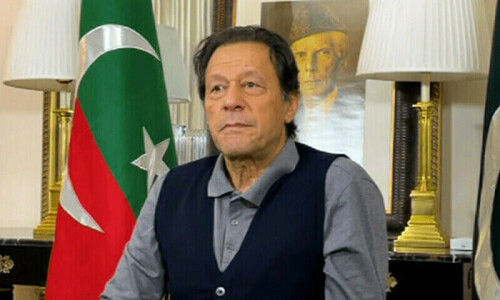ISLAMABAD: The Supreme Court has questioned whether the Sunni Ittehad Council (SIC) can be called a parliamentary party as per the law, since its chairman contested the general election as an independent candidate and joined his own party after the elections.
As the court was about to wind up Monday’s hearing of SIC’s petition against Peshawar High Court’s (PHC) decision to deny it reserved seats in the assemblies, Justice Naeem Akhtar Afghan put the question to Sikandar Bashir Mohmand, representing the Election Commission of Pakistan (ECP) and asked him to explain the anomaly.
The counsel was also asked to explain its impact on the existing political situation and present the nomination papers of SIC Chairman Sahibzada Hamid Raza.
At this, Chief Justice of Pakistan (CJP) Qazi Faez Isa suggested Mr Raza’s counsel, Faisal Siddiqui, to ensure his client’s presence in the courtroom for prompt response in case any question arises during the hearing.
PTI’s list of candidates included Hamid Raza’s name, recalls Justice Afghan; senior puisne judge thinks PTI ‘mishandled’ issue
The counsel, however, responded that his client must be in the National Assembly to participate in the budget session.
He added that there was no dispute over the fact that his client contested the election as an independent candidate and later joined SIC.
Justice Afghan remarked that a list of PTI’s contesting candidates for National Assembly issued by the party’s chairman, Barrister Gohar Ali Khan, on January 23, included the name of Mr Raza. The same was also uploaded on PTI’s website with Mr Gohar’s signature.
As an independent candidate, Mr Raza secured 128,687 votes, and if he later joined SIC, then his status would be the same as other PTI candidates, Justice Afghan emphasised.
He added that Mr Raza’s nomination papers would have to be reviewed to ascertain whether he got the votes only because of the affiliation with PTI, or any other reason.
PTI ‘mishandled’ the issue
Another bench member, Justice Mansoor Ali Shah, also wondered about the reason for PTI-backed candidates “to be in love” with SIC.
However, Salman Akram Raja, representing Kanwal Shozab — the PTI candidate aspiring for a women’s reserved seat — explained he was not privy to the party’s internal decisions.
Justice Shah regretted that PTI mishandled the entire issue.
He then addressed Mr Raza’s counsel and asked whether SIC, under Article 51 of the Constitution, was a political party which had not won a seat in the National Assembly.
If SIC is not a political party then how the proportionate representation system in the parliament will be worked out, Justice Shah asked stating whether these reserved seats will remain unrepresented in the assembly or not.
The counsel, Mr Siddiqui, explained that these reserved seats cannot be filled by giving them to other political parties.
If the court applies the same analogy and considered PTI a political party, notwithstanding that they did not get a common election symbol, these reserved seats be traced to where PTI candidates were going and if they ended up in SIC, these seats be given to the party.
The seats cannot be left empty, the counsel argued, adding the court has to find a mechanism to fill the reserved seats.
Doctrine of tracing
In a bid to find out a solution Justice Munib Akhtar cited the doctrine of “tracing” which suggested that if a person was entitled to certain funds, but those funds were shifting, in that case, the doctrine allowed tracing — locating and preserving those funds.
Mr Siddiqui contended that these reserved seats should go to SIC, and if it was not deemed a political party, they would remain vacant.
The counsel then came up with a suggestion where the court held that PTI-backed independent candidates did not rightly join SIC, yet they had the right to join a political party.
By setting aside the PHC verdict, independent candidates should be given three days to decide again which party they intend to join.
Justice Athar Minallah observed that the National Assembly could not be left incomplete under Article 51(1) of the Constitution and wondered which institution was responsible for completing the House.
It appears that the ECP, rather than acting as custodian of people’s rights, assumed an adversarial position, Justice Minallah regretted.
He remarked that the ECP grossly misinterpreted the Feb 13 Supreme Court judgement which denied “bat” as an election symbol to PTI.
The judge also wondered whether or not the Supreme Court should solve the crisis created by the ECP.
What prevented this court from exercising its jurisdiction under Article 184(3) of the Constitution, he questioned.
He recalled that initially, ECP distributed reserved seats amongst political parties but not to SIC. It then distributed SIC’s reserved seats to other parties.
“Should this court look the other way and allow the rights of the people to be trampled,” the judge asked.
It is the court’s duty to secure the fundamental rights which are being violated today, the judge observed, adding that the counsel should also explain the fear that forced PTI-backed independents to join SIC.
Justice Minallah also wondered whether or not PTI’s petition regarding general elections be heard along with the present case.
The counsel, Mr Siddiqui, conceded that PTI and SIC have committed a number of blunders and then cited a saying that translates into ‘those who take out our eyes blame us for our blindness’.
Justice Syed Hasan Azhar Rizvi wondered whether any voter ever protested over their elected representatives joining SIC.
The counsel replied the voters were, in fact, “happy”, and only the ECP protested the move.
Published in Dawn, June 25th, 2024













































Dear visitor, the comments section is undergoing an overhaul and will return soon.